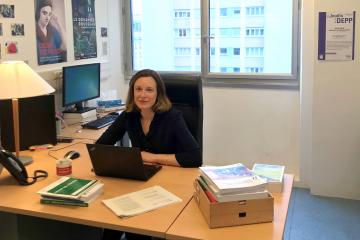
Facilitating access to administrative data in education: a fruitful partnership between IDEE and the French Ministry of Education

Photo : Daniel Rakotomalala, J-PAL
In September 2021, J-PAL Europe launched the Innovation, Data and Experiments in Education (IDEE) programme in partnership with the statistical service of the French Ministry of National Education and Youth, the Direction de l'Évaluation, de la Prospective et de la Performance (DEPP). To learn more about IDEE, visit our website and read this blog about our launch event.
Why facilitate access to administrative data for researchers?
In France, while a variety of innovations and public policies are being introduced to address challenges faced by the education system, few have been rigorously evaluated. IDEE supports the development of experimental research on education in France, with the goal of identifying the most effective programmes and interventions. Running this research requires reliable data on pupils, staff and schools. Data collection through field surveys is sometimes an essential, yet costly step… and the larger the sample, the more difficult the task. Fortunately, a great deal of high-quality data already exists on pupils’ skills, their educational trajectories, the careers of school staff and the characteristics of schools: administrative data on education.
Administrative data refers to a vast amount of individual and/or aggregated information stored in a structured and secure manner. This data can be matched within an appropriate legislative framework. Matching involves merging two or more sources of data on indicators (relating to pupils' career paths, their learning and/or their school environments) in order to considerably broaden analyses.
Thanks to the DEPP's statistical information system (SI), France has some of the richest administrative data on education when compared to peers in Europe and abroad. The DEPP's SI includes data for approximately:
- 60,000 schools and educational institutions (general characteristics and course selection, student population, staff and resources, performance),
- 1.2 million national education staff (individual characteristics, work-related responsibilities and where they work, career paths, continuing education, etc.),
- 13 million pupils and apprentices (individual characteristics, school environment, results of national assessments and examinations, career paths, etc.).
By making access to the DEPP’s administrative data easier for researchers, IDEE’s goal is to lower the costs of conducting experimental research by reducing the need to design ad-hoc surveys and to collect data on the ground. This can also enable researchers to diversify their study topics and conduct more large-scale and/or longitudinal quantitative research.
Although the DEPP conducts a variety of studies itself, it also partners with external researchers to generate knowledge about the French education system which can inform the public debate on education. To this end, one of its core objetcives is to support research—particularly by providing researchers with access to its data on education. In recent years, the quality and quantity of the DEPP’s datasets has increased, opening up new opportunities for empirical research and leading to an increase in data access requests. This, in turn, has led to new challenges for the service: namely how to better structure and document its datasets.
The IDEE/DEPP partnership was established precisely to meet these needs. According to Fabienne Rosenwald, Director of the DEPP: “With IDEE and other trusted partners, we are developing a system that meets both our internal needs at the DEPP and those of the research community, while guaranteeing data security and confidentiality”. The DEPP’s commitment to improving access to structured, documented data on education is an unprecedented opportunity for researchers in the field.
Currently, researchers can only access DEPP data through a multi-stage process: they submit a formal data request, which is in turn reviewed by the DEPP, leading to exchanges with the research team before any agreement is made allowing access to the data. This process could be more efficient while continuing to maintain the pre-existing close links between the DEPP and the research community with the implementation of new digital tools and resources. There is also a strong need to diversify research on education to enable researchers from a variety of disciplines and universities to make use of education data: for now, access to individual data can only be provided on DEPP premises due to data security and confidentiality concerns.
What does this partnership look like concretely?
IDEE is working with the DEPP to develop new IT tools and resources to encourage experimental research in education. The aim is to:
- Create and maintain a catalogue of existing data sets: The online catalogue is an informational tool that enables research teams to build and update their study protocols. The catalogue allows those less familiar with this data to discover the wealth of administrative data the DEPP has made available and thus to launch innovative and relevant research projects.
- Facilitate the management of data access agreements: The agreement management application aims to streamline coordination amongst all those involved in data access agreements, including several players at the DEPP and the universities/laboratories carrying out the research projects.
- Provide secure remote access to data for researchers: In order to further diversify and grow research in the field of education, researchers should be given remote access to administrative data through a data consultation and work platform that guarantees data security and confidentiality.
IDEE has provided the DEPP with the additional human and financial resources needed to foster these innovations: namely an IDEE Data Manager, Daniel Rakotomalala (PhD in economics), and an IDEE IT developer, Maéva Mollion (PhD in bioinformatics), who are embedded within the DEPP. IDEE also finances IT development services for the partnership. As echoed by Axelle Charpentier (Head of the Public Policy Evaluation and Research Support Office at the DEPP), the success of this project relies on close collaboration between IDEE and the DEPP: “These exchanges are effectively facilitated by the availability of IDEE staff within the DEPP”.
As part of the DEPP's IT team (at CISAD - Centre de l'informatique statistique et de l'aide à la décision/Centre for Statistical Computing and Decision Support), Maéva helps develop the IT tools discussed above. She is developing a centralised documentation management tool for the catalogue which will ease the documentation of all research data for the offices that produce them. She is also developing part of the remote access platform which manages working environments, data exploration and import (adding survey data) and export (outputting results) requests from researchers.
In conjunction with Maéva's work, Daniel is responsible for optimising the processes for documenting and making data available for research purposes and for the DEPP's offices.
By enabling all types of researchers–regardless of their location, discipline or familiarity with administrative data in education–to have easier access to this data, the tools developed by the DEPP in partnership with IDEE will hopefully diversify and increase rigorous research in the field of education.
Where do things stand a year and a half later?
According to Rosenwald, “the results are very positive, both in terms of the quality of the working relationship between IDEE and the DEPP and the progress made in achieving the IDEE programme’s objectives”.
In the partnership’s first year, the IDEE team carried out investigative work to further refine previously identified needs, while the DEPP IT team began to design technical solutions for setting up a secure remote access centre for DEPP data and what this would mean for the DEPP’s future IT development.
The DEPP published its data catalogue in November 2022 during the IDEE launch event, and its contents will be gradually expanded as the partnership progresses.
Committees made up of researchers, IDEE team members and DEPP staff have been set up to ensure the digital tools developed through the partnership meet the needs of all stakeholders. They met earlier this year to assess and provide feedback on the first mock-ups of the DEPP’s digital tools. A beta version should soon be available, and it will be tested collaboratively with research partners to further inform its development.
What’s next?
Beyond improving access to administrative data, the partnership supports evidence dissemination which could be used to inform the debate on education policies and practices. As Rosenwald points out, “the production and accumulation of scientific knowledge to inform educational policies and practices forces us to think about how best to capitalise on evidence, disseminate findings and encourage take-up of the lessons learned from research on education”. In particular, this means giving all those involved in education (decision-makers, school heads, teachers, etc.) easy access to the results of research. This requires communication strategies targeting them, as well as training and awareness-raising initiatives on evaluation approaches, which are supported by both IDEE and the DEPP.



